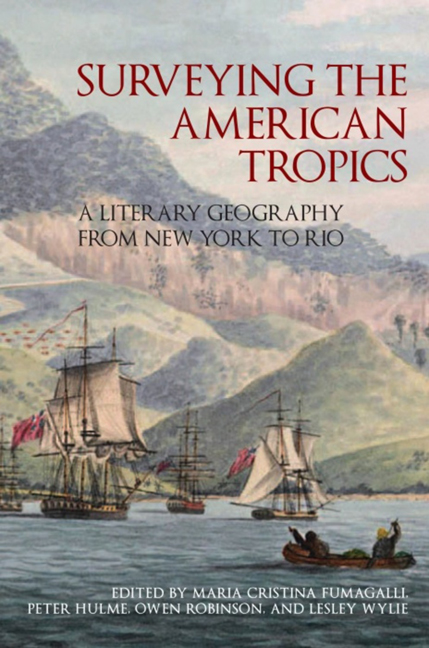Book contents
- Frontmatter
- Dedication
- Contents
- List of illustration
- Introduction
- A Tree Grows in Bajan Brooklyn: Writing Caribbean New York
- Reading the Novum World: The Literary Geography of Science Fiction in Junot Díaz's The Brief Wondrous Life of Oscar Wao
- Inventing Tropicality: Writing Fever, Writing Trauma in Leslie Marmon Silko's Almanac of the Dead and Gardens in the Dunes
- Imperial Archaeology: The American Isthmus as Contested Scientific Contact Zone
- Space Age Tropics
- Black Jacobins and New World Mediterraneans
- The Oloffson
- Dark Thresholds in Trinidad: Regarding the Colonial House
- Micronations of the Caribbean
- Golden Kings, Cocaine Lords, and the Madness of El Dorado: Guayana as Native and Colonial Imaginary
- Suriname Literary Geography: The Changing Same
- The Art of Observation: Race and Landscape in A Journey in Brazil
- Notes on Contributors and Editors
- Index
Dark Thresholds in Trinidad: Regarding the Colonial House
- Frontmatter
- Dedication
- Contents
- List of illustration
- Introduction
- A Tree Grows in Bajan Brooklyn: Writing Caribbean New York
- Reading the Novum World: The Literary Geography of Science Fiction in Junot Díaz's The Brief Wondrous Life of Oscar Wao
- Inventing Tropicality: Writing Fever, Writing Trauma in Leslie Marmon Silko's Almanac of the Dead and Gardens in the Dunes
- Imperial Archaeology: The American Isthmus as Contested Scientific Contact Zone
- Space Age Tropics
- Black Jacobins and New World Mediterraneans
- The Oloffson
- Dark Thresholds in Trinidad: Regarding the Colonial House
- Micronations of the Caribbean
- Golden Kings, Cocaine Lords, and the Madness of El Dorado: Guayana as Native and Colonial Imaginary
- Suriname Literary Geography: The Changing Same
- The Art of Observation: Race and Landscape in A Journey in Brazil
- Notes on Contributors and Editors
- Index
Summary
For a man's house is his castle, et domus sua cuique est tutissimum refugium. (Edward Coke, The Third Part of the Institutes of the Laws of England)
For the protection of your person, and of a few feet of your own property, it is lawful for you to take life, on so much suspicion as may arise from a shadow cast on the wrong side of your wall. But for the safety not of your own poor person, but of sixteen thousand men, women, and children … [and] a province involving in its safety that of all English possessions in the West Indies—for these minor ends it is not lawful for you to take a single life on suspicion, though the suspicion rest, not on a shadow on the wall, but on experience of the character and conduct of the accused during many years previous[?]. (John Ruskin, ‘A Speech in London [1866]’)
Since the 1970s, scholars have perceived the revolutionary moment in Trinidadian literature as taking place in the 1930s. The Beacon group, which emerged from a coterie of 1930s Trinidadian writers, was perceived as an inspired, iconoclastic precursor to the internationally-acclaimed 1950s generation of Caribbean writers. Post-1970s research, however, has drawn attention to the Beacon group's occasional conservatism, such as Alfred Mendes’ devaluation of Africa's cultural wealth. The problematic schisms of the Beacon group add extra complexity to the historiography of Trinidadian literature and call for a closer reading of Port of Spain's literary geography. Rather than the monologic imposition of empire or the consistent march of progressive anti-colonialism, such contradictions act as a reminder of the fractious history and geography of the region. Mary Louise Pratt writes of the ‘contact zones … where disparate cultures meet, clash, and grapple with each other, often in highly asymmetrical relations of domination and subordination’. Peter Hulme similarly elucidates, ‘no smooth history emerges, but rather a series of fragments, which read speculatively and hint at a story that can never be fully recovered’. Thus colonial and anti-colonial discourses across the American tropics emerge as palimpsests ‘made up of a variety of conflicting and contradictory frameworks’. Trinidad in the 1930s was no exception, as Harvey R. Neptune contends, perceiving the colony's emergent nationalist mobilisation as ‘strategic, uneven and at times ambiguous’.
- Type
- Chapter
- Information
- Surveying the American TropicsA Literary Geography from New York to Rio, pp. 202 - 230Publisher: Liverpool University PressPrint publication year: 2013



